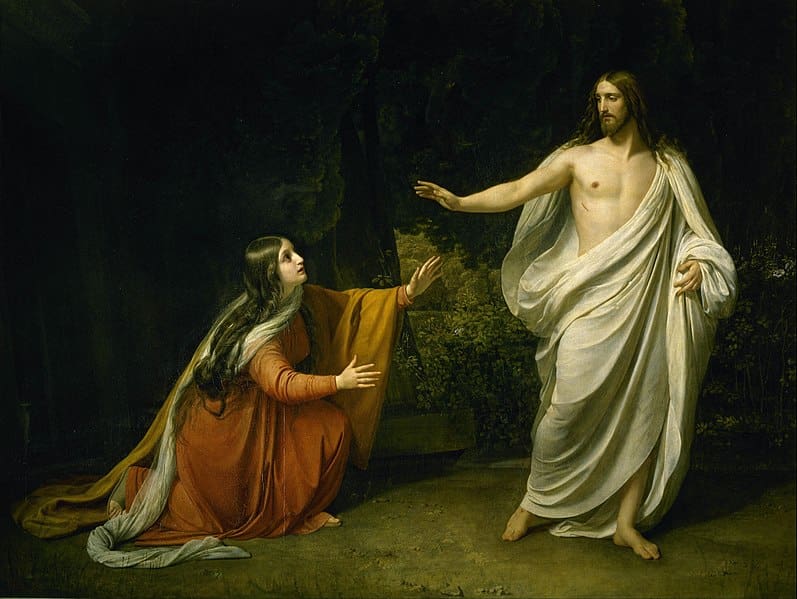Chastity and the consolation of Easter
“It is possible, with God’s grace, for everyone to live a chaste life, including persons experiencing same-sex attraction. To deny that the power of God’s grace enables those with homosexual attractions to live chastely is to deny, effectively, that Jesus has risen from the dead.”
These words of Cardinal Francis George, late archbishop of Chicago, are in some ways as startling today as they were when he spoke them in 1999, to the annual meeting of the National Association of Catholic Diocesan Lesbian & Gay Ministries. We are becoming accustomed to separating pastoral practice from doctrinal teaching, and so it is becoming more difficult to see how the historical moment of the Resurrection, so many centuries ago, has much to say about the day to day experiences, desires and difficulties of men and women in the modern world.
But for Christians, these days of the Paschal Triduum — when we commemorate the Passion, Death and Resurrection of the Lord — stand not only at the center of our calendar, but at the heart of our faith. “If Christ has not been raised, then our preaching is in vain and your faith is in vain” (1 Cor 15:14), Saint Paul says, and we are able to believe, embrace and follow Christ’s commandments and the teachings of the Church only because they come from the Risen One. “All truths, even those most inaccessible to human reason,” the Catechism explains, “find their justification if Christ by his Resurrection has given the definitive proof of his divine authority, which he had promised” (no. 651).
Our proclamation of the Resurrection is good news for the whole world, and offers consolation and hope to our brothers and sisters who are living with the experience of same sex attraction, in their own lives or in the lives of loved ones. In particular, the mysteries of the Triduum provide a definitive answer to many of the objections that we often hear, when people insist that the Church’s teaching is too idealistic, or that the obstacles to receiving God’s grace are insurmountable.
“The Church wants us to live by these strict laws, but Jesus was not legalistic. His message was love.” Absolutely it was. And from the Last Supper table, he tells us what this love means, and the kind of loving relationship he desires to have with us. “I have called you my friends,” he tells his apostles, and us, “because I have made known to you everything I have heard from my Father” (Jn 15:15) He also says, “You are my friends if you do what I command you” (Jn 15:14). He tells us the truth about ourselves, and he expects us to embrace and live that truth.
“Chastity is too difficult. All that sacrifice and self-denial may be fine for a priest or nun who’s called to it, but it can’t be an expectation for everyone.” Again, before he lays down his very life for us, Jesus gives us a new commandment: “Love one another as I have loved you” (Jn 15:12). The depth of this love is revealed in sacrifice: “No one has greater love than this, to lay down one’s life for one’s friends” (Jn 15:13). It’s true that, in order to achieve the “successful integration of sexuality within the person” that defines chastity (Catechism, no. 2337), some self-sacrifice and restraint will be necessary. But in the context of our friendship with Christ, chastity is not just “giving up” but “giving to” — our self-sacrifice makes possible authentic friendship with Christ and with others, and “the virtue of chastity blossoms in friendship” (no. 2347).
“Public opinion accepts same sex relationships; they’re even enshrined in our laws. And the majority of young Catholics are in favor of them. Why doesn’t the Church get with the times?” On the morning of Good Friday, after his claims to his divine identity were rejected by the religious leaders of his own people, Jesus was handed over to the civil authorities. The Roman governor cannot understand why Jesus acts the way he does — why not just go along with Rome in order to save his own life? Jesus reveals his mission to Pilate, and through him to the world: “For this I was born, for this I have come into the world, to testify to the truth” (Jn 18:37). The governor is mystified: “What is truth?” he asks (v. 38), perhaps not really expecting an answer. Yet the Lord does reply: though remaining silent in that moment, he speaks eloquently through his actions over the next few hours. His Passion proclaims his testimony: No matter what the powers of this world may prefer, I will not go along to get along, I will not swerve from the path that the Will of my heavenly Father has marked out for me.
“I’ve tried a million times to live chastity, but I just can’t make it. If I’m eventually going to give in anyway, why put myself through all this?” One of the most beautiful traditions in our celebration of the Passion is not recorded in the Scriptures, but arises from the spiritual instinct of the people. Twenty percent of the Stations of the Cross — three of the fourteen stations — recalls the falls of Jesus under the weight of the Cross. The condemned One does not avoid any aspect of our human experience — “in every respect [he] has been tested as we are, yet without sin” (Heb 4:15) — and so in his falls we remember the compassion that he has for us when we have fallen under the weight of our sins. “The Son of Man came to seek out and to save the lost” (Lk 19:10), and he finds us in our most desperate moments by entering into them with us: he can “sympathize with our weakness” (Heb 4:15). When we embrace our crosses, rather than trying to avoid them, we find him helping us to get up and keep moving.
“It’s too late for me to change my life. And God wouldn’t accept me back at this point anyway.” Here is the greatest lie of the Enemy, and the Lord refutes it at the very moment of his death. To the repentant thief, he promises salvation: “Today you will be with me in Paradise,” (Lk 23:43) and nothing need stand in the way anymore of our receiving the same promise. Even those who are trapped in habits of mortal sin should not despair of the healing mercy of God: theirs is the mystery of Holy Saturday, of the Body of Christ lying in the tomb, waiting the miracle that is to come. “We should never come to a sinner without the reverence that we would take to the Holy Sepulchre,” the English author Carryl Houselander wrote in The Reed of God. “In sinners we can kneel at the tomb in which the dead Christ lies” (p. 160). And when they come to the sacrament of Reconciliation, the life of Christ is raised up in them anew, and they participate in all the joy of Easter morning.
Christ is risen! With the whole Church we proclaim the joy of the Resurrection, as the Easter Proclamation known as the Exultet teaches us: “This is the night that even now, throughout the world, sets Christian believers apart from worldly vices and from the gloom of sin, leading them to grace and joining them to his holy ones.” Our message to the world, and especially to those under our care, during this Easter season, has to be one of confident hope, based on the fact that God keeps his promises.
From the very beginning, every temptation, to unchastity or to any other vice, has always begun with doubting the goodness of God and of his plan for us. “But God proves his love for us in that while we still were sinners Christ died for us” (Rom 5:8). The Paschal Mystery resolves every doubt about God’s love for us, and about the power of that love to accomplish in us what we cannot do for ourselves. “It would be a very serious error,” Saint John Paul II wrote in Veritatis splendor (no. 103), “to conclude that the Church’s teaching is essentially only an ‘ideal’ … Christ has redeemed us! This means that he has given us the possibility of realizing the entire truth of our being; he has set our freedom free from the domination of concupiscence,” and enabled us to live the life he won for us in his Passion and Resurrection.
Fr. Philip Bochanski, a priest of the Archdiocese of Philadelphia, assumed the role of executive director of Courage International in January, 2017, following his tenure as associate director of the apostolate. Previously, Fr. Bochanski has served as chaplain of Philadelphia’s Courage chapter.


